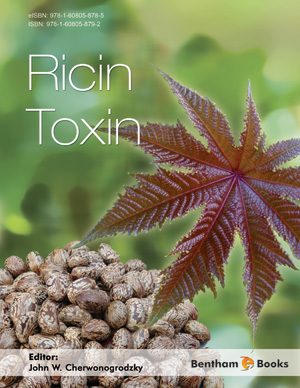Abstract
Ribosome Inactivating Proteins (RIPs) are toxins capable of specifically and irreversibly inhibiting protein synthesis in eukaryotic cells. The plant RIP prototype, ricin, is a vigorous toxin that can be easily extracted and purified from the castor plant Ricinus communis. This heterodimeric toxin consists of a catalytic subunit A linked to a galactose-binding lectin subunit B, which allows cell surface binding and toxin entry in most mammalian cells. Ricin exhibits potency in the picomolar range, thereby it is highly toxic at very low lethal doses. Due to its high systemic cytotoxicity, ease of production, and prevalence, ricin is considered as a possible weapon for warfare and terrorism attacks, and therefore included among the potential biological weapons by the United State Centre of Disease Control and Prevention. Since heating denatures the toxin, extracted castor oil has been widely used in the industry; for example, as twostroke engine oil or lubricant for aviation engine. However, castor oil has also detrimental effects causing violent diarrhea. Thus, even castor oil has been used as a convenient terror weapon under the Italian Fascist regime to convert “red” workers. Nowadays, more peaceful and beneficial medicinal uses have been created. Certainly, the most promising way is to exploit ricin as weapon to combat cancers. Novel molecules in which the toxin moiety of ricin was linked to selective tumour targeting domains have been generated for cancer therapy. The major recent advancements in this field will be discussed in this chapter.
Keywords: Ricin, RIPs, cancer, therapy, immunotoxins.






















